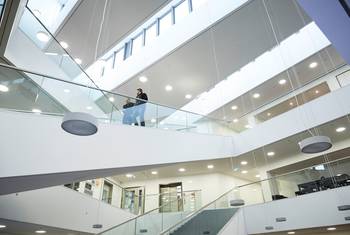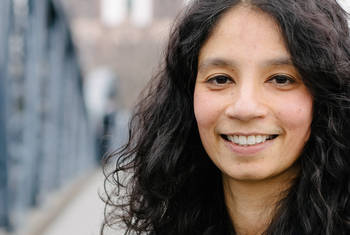Uwe Ohler How Are Different Transcripts in Our Genome Translated Into Proteins?
Uwe Ohler is Professor of Biology at the Max Delbrück Center in Berlin and Professor of Computer Science at Humboldt University Berlin. He is also Adjunct Associate Professor of Biostatistics and Bioinformatics at Duke University Medical School. Some of his previous affiliations include the University of California at Berkeley and the Massachusetts Institute of Technology. His research interests include computational biology, machine learning for modeling and classification of genomic data, and the identification of non-coding RNAs and their targets. Since 2011, he has been Deputy and Senior Editor of PLoS Computational Biology. He has received several fellowships and awards, including the Alfred P. Sloan Fellowship and the NSF Career Award.
Area of Research
Medical Systems Biology
since 2012
Investigator
Max Delbrück Center for Molecular Medicine (more details)
Berlin Institute for Medical Systems Biology (BIMSB)
since 2012
Professor
Humboldt University of Berlin (Humboldt-Universität zu Berlin)
Department of Biology / Department of Computer Science
since 2014
Adjunct Associate Professor
Duke University
Medical School
2005-2014
Assistant / Associate Professor in Computer Science
Duke University
2011-2014
Associate Professor
Duke University
Medical School
2005-2011
Assistant Professor of Computational Biology
Duke University
Medical School
2005-2014
Investigator
Duke University
Institute for Genome Sciences and Policy
2002-2004
Postdoctoral Associate
Massachusetts Institute of Technology (MIT)
2001-2002
Junior Specialist
University of California, Berkeley
Drosophila Genome Project
2002
PhD in Computer Science
Friedrich-Alexander-Universität Erlangen-Nürnberg
1996
Diploma in Computer Science
Friedrich-Alexander-Universität Erlangen-Nürnberg
- Bioinformatics
- BMC Bioinformatics
- BMC Genomics
- Cell Reports
- Cell Systems
- Drug Discovery Today
- Epigenetics and Chromatin
- FEBS Letters
- Genetics
- Genome Biology
- Genome Research
- Genomics
- IEEE Intelligent Systems
- Journal of Molecular Evolution
- Molecular Cell
- Nature
- Nature Communications
- The Plant Journal
- PLoS Biology
- Trends in Genetics
- et al.
Prizes
- HFSP Young Investigator, 2008-2011; 2012-2015 (renewal)
- NSF CAREER award, 2010-2013
- “Scientist to watch”, The Scientist Magazine, May 2010
- Named as one of “Tomorrow’s PI”, Genome Technology Magazine, December 2008
Fellowships
- Alfred P. Sloan Fellow in Computational and Evolutionary Molecular Biology, 2005-2007
- Boehringer Ingelheim pre-doctoral fellow, 1998-2001
 © Katharina Bohm/MDC
© Katharina Bohm/MDC

Max Delbrück Center for Molecular Medicine
Berlin, Germany'The Max Delbrück Center for Molecular Medicine in the Helmholtz Association was founded in January 1992 on the recommendation of the German Council of Science and Humanities (“Wissenschaftsrat”) with the goal of linking basic science to clinical research. The Berlin Institute for Medical Systems Biology (BIMSB) is an expansion of the MDC into Medical Systems Biology. The MDC integrated parts of three former Central Institutes of the GDR Academy of Sciences and was named for Max Delbrück, a physicist, biologist, and Nobel Prize winner. Currently the institute employs more than 1600 people from nearly 60 countries; over 1300 of those are directly involved in research. The MDC’s annual budget is over 80 million Euros, along with substantial third-party funding obtained by individual scientific groups. As is the case with all Helmholtz institutes, the MDC receives 90 percent of its funding from the federal government and 10 percent from Berlin, the state where it resides.' (source)
Institute
Berlin Institute for Medical Systems Biology (BIMSB)
'Systems Biology integrates high-throughput technologies, mathematics, bioinformatics, molecular biology, biochemistry and engineering to derive predictive, quantitative models for biological systems, which may be molecules, cells, organisms or entire species. In combination with biomedical research, Systems Biology has the potential to steer medicine into the next century of personalized medicine.
In combination with the major disease oriented programs of the MDC, Medical Systems Biology is an essential strategic and overarching component of the scientific profile of the MDC: the Berlin Institute for Medical Systems Biology (BIMSB) was launched in 2008. The scientific concept was initiated by Nikolaus Rajewsky, who is now leading the program and its further developments.
Research at the BIMSB is focused on the understanding of gene regulatory networks, in particular transcriptional and post-transcriptional processes and their integration with major cellular regulatory mechanisms, such as protein-protein and protein-DNA/RNA interaction networks, signal transduction pathways, post-translational modifications, metabolic feedback, both, in health and disease states.' (source)
Map
Our genes only make up about one or two percent of the human genome; the rest of the genome contains other functions including how the genes get activated. In current understanding, this regulation of the genes contains the key to the complexity of human development. Many parts of the human genome, not only the genes, get transcribed and the function of these thousands of transcripts is not yet understood. This is a question UWE OHLER is interested in. In this video, he specifically addresses the question of how many of these different transcripts actually get translated into proteins. Using new sequencing technologies the researchers around Ohler have obtained large genomics data sets with lots of noisy data. Responding to this challenge they successfully developed computational approaches to make sense of them. They thus found new insights into the gene regulation process and answers to the puzzle of non-coding transcripts.
LT Video Publication DOI: https://doi.org/10.21036/LTPUB10588
Integrative Classification of Human Coding and Noncoding Genes through RNA Metabolism Profiles
- Neelanjan Mukherjee, Lorenzo Calviello, Antje Hirsekorn, Stefano de Pretis, Mattia Pelizzola and Uwe Ohler
- Nature Structural & Molecular Biology
- Published in 2017
Detecting Actively Translated Open Reading Frames in Ribosome Profiling Data
- Lorenzo Calviello, Neelanjan Mukherjee, Emanuel Wyler, Henrik Zauber, Antje Hirsekorn, Matthias Selbach, Markus Landthaler, Benedikt Obermayer and Uwe Ohler
- Nature Methods
- Published in 2016









